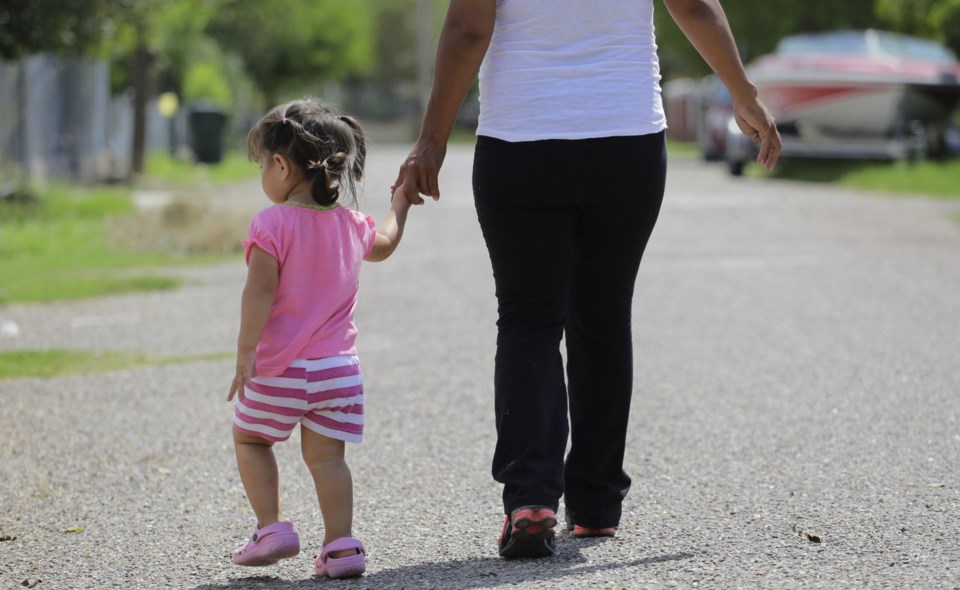GREENBELT, Md. (AP) — A federal judge on Wednesday ordered a second nationwide pause on President Donald Trump’s executive order seeking to end birthright citizenship for anyone born in the U.S. to someone in the country illegally, calling citizenship a “most precious right.”
U.S. District Judge Deborah Boardman said no court in the country has endorsed the Trump administration’s interpretation of the 14th Amendment.
“This court will not be the first,” she said.
She added: “Citizenship is a most precious right, expressly granted by the 14th Amendment to the Constitution."
Boardman said citizenship is a “national concern that demands a uniform policy,” adding that “only a nationwide injunction will provide complete relief to the plaintiffs.”
After reading her ruling from the bench, the judge asked a government attorney if they would be appealing her decision. The attorney said he didn’t have the authority to immediately take a position on that question.
Trump’s inauguration week order had already been on temporary hold nationally because of a separate suit brought by four states in Washington state, where a judge called the order “blatantly unconstitutional.”
That temporary hold is set to expire on Thursday. Boardman's preliminary injunction puts the executive order on hold until the merits of the case are resolved, barring a successful appeal by the Trump administration.
In total, 22 states, as well as other organizations, have sued to try to stop the executive action. Further hearings, similar to the one Boardman conducted on Wednesday, are due later this week in other birthright citizenship cases.
Boardman, nominated by former President Joe Biden, agreed to the preliminary injunction after a hearing federal court in Greenbelt, Maryland. Immigrant-rights advocacy groups CASA and Asylum Seeker Advocacy Project, and a handful of expectant mothers brought the suit before Boardman.
Plaintiffs’ attorney Joseph Mead said many parents who would be impacted by Trump’s executive order have lived in the U.S. for months or even years.
“They’re not temporary visitors,” he told the judge. “They have made America their home.”
At the heart of the lawsuits is the 14th Amendment to the Constitution, ratified in 1868 after the Civil War and the Dred Scott Supreme Court decision that determined Scott, a slave, wasn’t a citizen.
“The principle of birthright citizenship is a foundation of our national democracy, is woven throughout the laws of our nation, and has shaped a shared sense of national belonging for generation after generation of citizens,” the plaintiffs argued in the suit.
The Trump administration asserts that children of noncitizens are not “subject to the jurisdiction” of the United States and therefore not entitled to citizenship.
“The Constitution does not harbor a windfall clause granting American citizenship to, inter alia: the children of those who have circumvented (or outright defied) federal immigration laws,” the government argued in reply to the Maryland plaintiffs’ suit.
The 14th Amendment was added in the aftermath of the Civil War to ensure citizenship for former slaves and free African Americans. It states: “All persons born or naturalized in the United States and subject to the jurisdiction thereof, are citizens of the United States and of the State wherein they reside.”
In addition to the 22 states with Democratic attorneys general seeking to stop the order, 18 Republican attorneys general announced this week that they’re seeking to defend the president’s order by joining one of the federal suits brought in New Hampshire.
The U.S. is among about 30 countries where birthright citizenship — the principle of jus soli or “right of the soil” — is applied. Most are in the Americas, and Canada and Mexico are among them.
During his first week in office, Trump signed 10 executive orders on immigration and issued edicts to carry out promises of mass deportations and border security.
Some actions were felt immediately. Others face legal challenges. If they happen at all, other orders may take years to happen but have led to fear in immigrant communities.
Whether Trump can enact his agenda could come down to money. Congress is expected to consider funding support soon. Trump may use emergency powers to tap the Defense Department, as he did for a border wall during his first term.
Michael Kunzelman And Mike Catalini, The Associated Press

